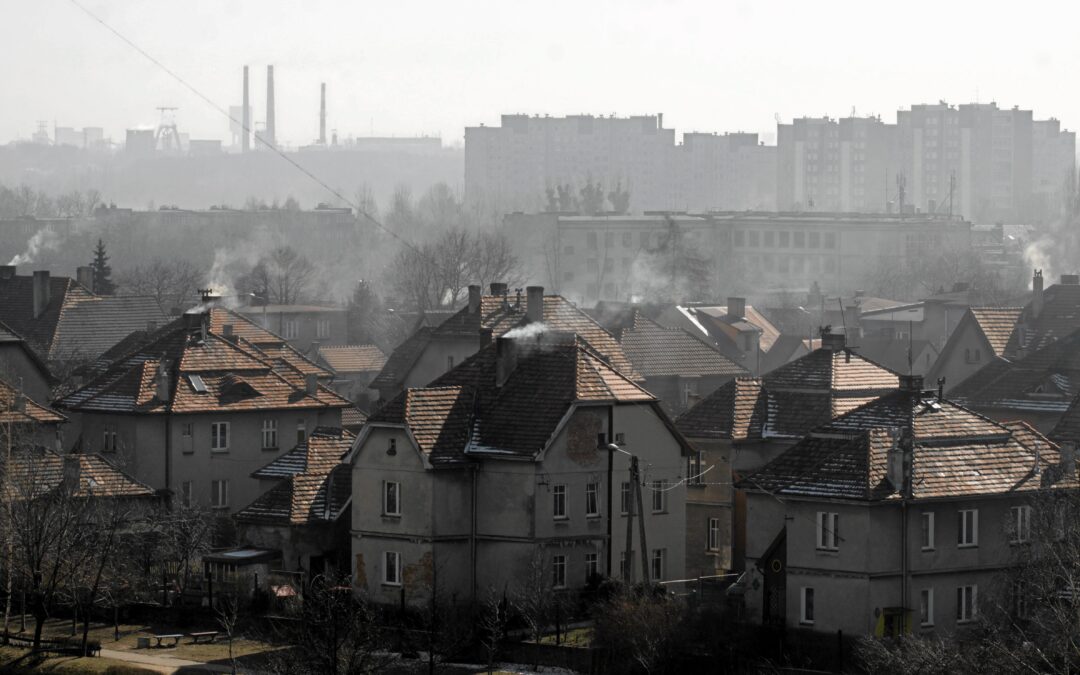A new study has found that children in a Polish city had over four times the level of harmful substances from air pollution in their bodies as their counterparts in France.
Poland has long struggled with some of the worst air pollution in Europe. And Rybnik, a city of 140,000 in the industrial region of Silesia, is among the most polluted in the country.
It has the fifth worst air in the entire European Union, according to a World Health Organisation ranking based on the quantity of the smallest and most dangerous PM2.5 particulates.
Poland has 36 of Europe's 50 most polluted cites on an updated list published by @WHO (up from 33 on the previous ranking). 72% of Polish cities violate the EU's air quality target (second only to Bulgaria at 83%).
Chart via @UE: https://t.co/O0RnVwrBRF pic.twitter.com/tdRcTvtqz7
— Notes from Poland 🇵🇱 (@notesfrompoland) May 8, 2018
The new study – conducted by Tim Nawrot, a professor of biology at Hasselt University in Belgium – compared urine samples from 26 children in Rybnik with the same number of their counterparts in the French city of Strasbourg.
It found that the levels of black carbon – a substance produced by burning fossil fuels – was on average over four times higher in the samples from Polish children than in those of their French peers. In some samples if was nine times higher.
“I have never seen such a high concentration in similar samples before,” said Nawrot during a presentation of the findings in Rybnik, cited by Gazeta Wyborcza.
Nawrot notes that exposure to particulate matter pollution, including black carbon, is particularly damaging to children, due to their higher respiratory rate and still-developing bodies.
It is associated in early life with decreased cognitive abilities, impaired cognitive ageing and increased cardiovascular mortality. It also raises the risk of respiratory diseases and cancer in later life.
A separate study conducted in the children’s wing of the a local hospital last year found that air pollution made brain tumours more common in children living in Rybnik than in other parts of Poland. Exposure to air pollution also diminished concentration and was linked with lower intelligence, reports Gazeta Wyborcza.
Nawrot’s findings have been presented by Rybnik Women’s Council to the climate and environment minister, Michał Kurtyka.
“This study…[reflects] the sad reality of the effects of air pollution in some regions of our country,” said Kurtyka, quoted by Gazeta Wyborcza. “It vindicates us in our plans to reduce and gradually withdraw coal from Poland’s future energy mix.”
The Polish government recently announced a deal with miners to close all coal mines by 2049. It is part of a plan to accelerate Poland’s withdrawal from coal, which currently accounts for 73% of energy production, the highest level in the EU.
The government has also recently moved to bolster its flagship “Clean Air” programme, which provides subsidies to help households upgrade to cleaner heaters and better insulation.
However, critics argue that its transition away from coal is still too slow, while they note that the Clean Air scheme has so far been a failure, with poor administration and low take-up.
Last month, the Air Quality Life Index (AQLI), an international pollution ranking, found that Poland had the worst air quality in Europe. The European Environment Agency estimates that air pollution causes almost 50,000 premature deaths in Poland annually.
Small and medium towns. especially in southern Poland, generally have more significant smog problems than larger cities. Pollution in such places is in large part caused by residents burning low-quality coal and wood to heat their homes – or in some cases illegal substances such as household waste.
Rybnik is also home to a coal-fired power plant built in the 1970s, and the city has long suffered some of Poland’s poorest air. In 2018, it was ranked second worst in an air quality table compiled by Polish Smog Alarm, an NGO.
There have, however, been some signs of improvement. The AQLI ranking noted that a fall in air pollution over the last two decades has seen life expectancy increase by an average of two years in Silesia.
While government-led efforts have had a limited impact so far, many cities have taken the lead in addressing their problems with smog.
Kraków, which has been notorious for its bad air, last year became the first place in Poland to ban the burning of coal and wood. Various cities have also used drones to check if residents are burning illegal substances in their homes. Many areas are expanding their fleet of electric buses and offering free public transport during times of bad pollution.
A side effect of the coronavirus pandemic and associated slowdown in economic activity and use of transport has also been cleaner air. The lockdown resulted in around 800 fewer premature deaths in Poland during April, according to a report by the Centre for Research on Energy and Clean Air (CREA).
Main image credit: Agencja Gazeta/Dominik Gajda

Maria Wilczek is deputy editor of Notes from Poland. She is a regular writer for The Times, The Economist and Al Jazeera English, and has also featured in Foreign Policy, Politico Europe, The Spectator and Gazeta Wyborcza.




















